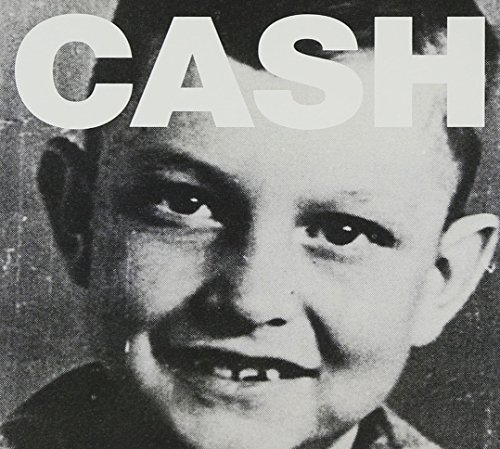
Johnny Cash
American VI: Ain't No Grave
Release Date: Feb 23, 2010
Genre(s): Rock, Country
Record label: Lost Highway
Music Critic Score
How the Music Critic Score works
Album Review: American VI: Ain't No Grave by Johnny Cash
Great, Based on 9 Critics
Based on rating A
Producer Rick Rubin really did save the best for last. There are none of the folk-alt-rock karaoke selections of previous American discs on American VI: Ain’t No Grave, just 10 ?wholly appropriate picks that speak to the gravity of ?Johnny Cash’s situation and his joy ?in both life and death. His ?voice sounds more vulnerable, less “iconic,” more human.
Based on rating 89%%
Johnny Cash’s final album opens on a portentous but hopeful note: “There ain’t no grave/can hold my body down.” Comprised of tracks recorded with Rick Rubin right up until Cash’s death in late 2003, American VI is a fitting send-off for the Man in Black. The covers are impeccably chosen and range from Queen Lili’uokalani’s traditional Hawaiian farewell “Aloha Oe” to Tom Paxton’s questing “Can’t Help but Wonder Where I’m Bound.” However, it’s Cash’s lone original, the sparsely sketched “1 Corinthians: 15:55,” that shines the brightest. .
Based on rating 8/10
Released for the occasion of Johnny Cash's 78th birthday, American VI: Ain't No Grave is the final installment in the collaboration between Cash and Rick Rubin that began with 1994’s American Recordings. These ten songs were cut during the same sessions for American V: A Hundred Highways. Guitarists Mike Campbell, Matt Sweeney, Smokey Hormel, and Benmont Tench on keyboards were present, as were other musicians.
Based on rating 8/10
The newest, and purportedly last, installment of Johnny Cash’s “American series”, the priceless Rick Rubin-produced string of albums that rounded out Cash’s life, is American VI: Ain’t No Grave. This is the second of the American albums to be released posthumously, following American V: A Hundred Highways, and these 11 songs are mined gold from the sporadic 2002 sessions that produced the Highways record. Subsequently, there are no real surprises on Ain’t No Grave.
Based on rating 4/5
Though he's been gone for almost seven years, Johnny Cash hasn't really left the public consciousness, thanks to that biopic and a slew of post-mortem releases, most notably 2006's American V: A Hundred Highways, his last recordings with Rick Rubin, the producer who redefined his career. [rssbreak] Ain't No Grave cleans out the Cash-Rubin vault with tunes that were laid down, like those on A Hundred Highways, in the last year of his life, a year that included the devastating loss of his wife, June. From the church-bell-ringing, banjo-plucking funereal title track opener to the into-the-sunset Hawaiian ballad Aloha Oe that closes the album in perfect cinematic form, Cash sounds completely at ease, and wholly preoccupied, with the approach of his own death.
Based on rating 7.2/10
If Ain’t No Grave, the final installment in Johnny Cash’s rich collaboration with producer Rick Rubin, had appeared in, say, 1980, in the midst of an otherwise undistinguished run of Cash albums, it would have hardly caused a ripple. The raw ingredients—a few covers of well-known country hits, a couple of traditional folk songs, an original sacred composition—reprise the same formula that Cash employed since the early ’70s. It had all been done before, and many times.
Based on rating 3.0/5
Coming a few days before what would have been his 78th birthday, American VI: Ain’t No Grave attempts to restyle the end of Johnny Cash’s career on a somewhat uplifting note, favoring simple spiritual affirmations, rendered in a somber but not bleak style. And though it remains to be seen whether The Man Comes Around, with its less forcefully cohesive tone and epithetic “Hurt” music video, was the best way for Cash to go out, Ain’t No Grave is most likely the last new material we’ll see from him. Rubin shaped Cash’s two posthumous albums, this and 2006’s A Hundred Highways, from the over 50 songs produced in his last recording sessions.
Based on rating 5.7/10
Johnny Cash recorded most of the tracks for the fifth and sixth installments of his American Recordings series between his wife June Carter Cash's death in May 2003 and his own just four months later. He was in poor health, and the effects of Shy-Drager syndrome prevented him from working most days. But when he felt up to it, he recorded; when he felt too weak, he wished he were recording.
Opinion: Very Good
JOANNA NEWSOM“Have One on Me”(Drag City) Maybe it’s preposterous to suggest that Joanna Newsom’s three-CD, two-hour album, “Have One on Me,” is in any way stripped down. Along the way its songs deploy horns and strings, electric guitar and African and Balkan instruments alongside Ms ….

